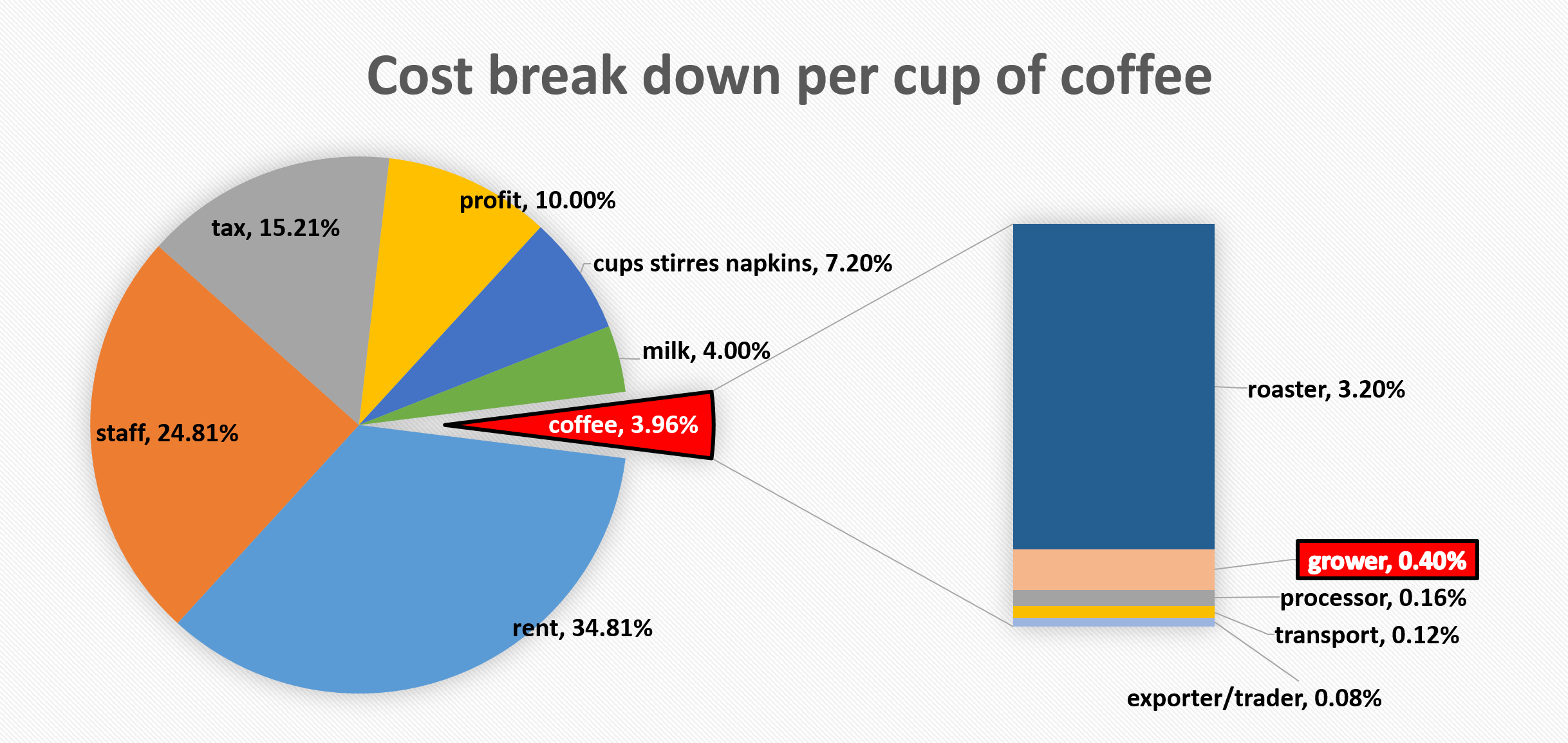If you think you are no longer an average coffee consumer and you are ready to move forward. Eager to discover more about, quality, processing, origin and the endless complexity of the coffee value chain. There is no better way to do so, than by roasting your own coffee beans. Moreover, it is affordable and fun too.
In this article I want to summarize a few important reasons. Why you should consider and learn about roasting your own coffee.
Price
It is not a mystery that more than 80% of the entire coffee revenue. From seed to cup is concentrated at the end of the coffee value chain. More specifically among roasters and coffee shops. Unfortunately, these are the only supply chain links; regular consumers have access to. However, for quite some time retailers have started to sale green coffee beans online. If you have access to amazon.com, ebay.com, etc. You can get the same beans. You normally buy at coffee shops and reputable roasters for even a third of the price.

Based on the chart above. Farmers receive an average share of 0.4% for each cup of coffee sold to the public. It is noteworthy; this share could be even 3 times lower for milk based coffee drinks. Nevertheless, for roasted coffee, the share is between 10% to 12%. In conclusion, you can save considerably in coffee expenses. By just bypassing roasters and cafes and at the same time help coffee producers and processors. By roasting your own coffee.
SEE ALSO: Is coffee really good for your health?
Quality
You do not need to settle for the regular coffee retailers have to offer. Probably their interests are different from yours. Usually companies’ commercial strategy and budget are priority over their sense of taste and quality control. By sourcing and roasting yourself, the decisions are all yours. Additionally by trying different roasting profiles, you can have several batches and flavors from the same beans.
When I used to live in Costa Rica. Including even the outrageous shipping and taxes fees. I was able to get fresh quality green beans from all over the world at fair prices. However, unluckily for other coffee producing countries like Brazil. Green coffee imports are strictly forbidden and roasted beans pay 60% import tax.
Nonetheless, as a side note. Costa Rica is the only coffee producing country that imports more coffee than the one it produces. Their own known quality beans get better prices overseas and commodity coffee imports help by satisfying local demand.
In general producing countries leave their least valuable coffees for local consumption. Using their best for exports and/or as a source of foreign currency.
So if you are in a producing country. My advice to you is. Find out, green coffee importing regulations before you buy online and do your own research about the local coffee scene. Always trying to get your hands into the best coffees before they leave the country. Usually, good coffees are not easily available. Yet local baristas are aware of the situation and they could be a good starting point for your research.
Value
It takes around 9 months of hard work for a farmer to grow and harvest his coffee. 3 months for a processor to collect it and transform it into an exportable product. And several stressful weeks for importers to move it around the world while assuming a great financial risk. Only takes 15 minutes of work for a roaster to have it ready for sale. And 20 seconds for a barista to pull an espresso.
The unbalance created by the accumulation of revenue high in the value chain. In spite of value. triggers a disproportional distribution of power. Favoring corporations by creating the illusion of value addition while neglecting producers and underestimating their exceptional work.
Surprisingly, the same corporations often take the lead. By creating and financing initiatives aimed to deal with industry’s most pressing social and environmental issues. Not only representing a conflict of interests but also an obstacle to achieve real long-term sustainability.
By buying coffee green and roasting it yourself. You are paying to the people who actually added the value. Instead to the ones who only accumulated the revenue by selling you the illusion of value.
SEE ALSO: Why does roast color matter?
Traceability
Roasters and coffee shops have filled the media with bias information. Sometimes what seems like real information is actually a different way of marketing. Their presence is pervasive, their influence has silenced producers and farmers ‘own voice all over the world. Additionally, the beautiful packaging, well-picked typography and strong social media presence distract us from what it is essential.
By roasting and sourcing green coffee yourself. You will have the opportunity to meet producers who sell directly their own beans online. It does not get more transparent or direct-trade than that. The best of all is. Their success will inspire other producers to do the same and we will help the industry by reducing the gap between producers and final consumers.
Whom, when and where does coffee come from? Should always be the first questions to ask ourselves before consuming a cup of coffee regardless the marketing around it. Some companies use marketing to fill the gap of information they ignore. We should remember information is key. In a coffee industry tainted by decades of slavery, injustice, indifference and lack of transparency.
By sourcing and roasting yourself. All of the sudden. Packaging, branding, roaster, etc. Immediately become irrelevant and only the taste, fragrance and aroma take their place.
So close your eyes take a sip and enjoy
